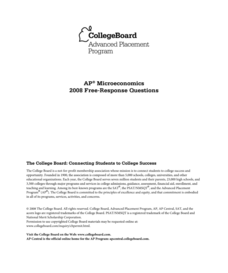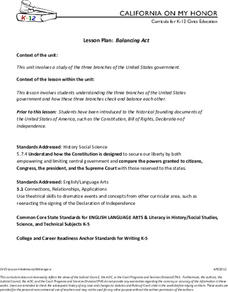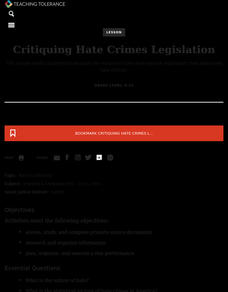iCivics
Separation of Powers
In a fun and informative simulation, your learners will act in groups as lead chefs, menu writers, and nutrition inspectors in deciding a new school lunch menu. They will then compare and contrast their experience to the interaction...
Curated OER
George Washington: The Precedent President
Students investigate precedents set during George Washington's term in office. They conduct Internet research, develop a list of the responsibilities of the President, match Washington's accomplishments with the list, and play a game.
Curated OER
The Great Depression and Everyday Life
Examine everyday life during the Great Depression, as well as the effects if the Depression on American population, society, and economy. Learners write who, what, where, when, and why summaries of a person who relocated to California...
Carolina K-12
Principles of the US Constitution
After breaking into groups according to major principles of government (i.e., popular sovereignty, separation of powers, checks and balances, etc.) in the United States, your class members will produce public service announcements...
Curated OER
Lesson 2: The Constitution: Our Guiding Document
Explore the structure and content of the US Constitution in the second lesson of this five-part social studies series. A collection of activities, games, and videos complement a class reading of a document summarizing the US...
College Board
2008 AP® Microeconomics Free-Response Questions
The government can tweak the economy through a variety of tools. What are their long- and short-term effects? A problem set from College Board examines how the government sometimes pulls the strings to control the economy.
Judicial Branch of California
Balancing Act: The Three Branches
What do hula hoops and the American system of government have in common? Using hands-on station activities, pupils consider the roles of the three branches of government. A script for teachers and writing prompts help round out a...
iCivics
iCivics Backyard Adventure
Imagine arguing a real Supreme Court case! Running your own county government! Acting as President for a day! iCivics offers games, web scavenger hunts, and other activities that encourage summer scholars to learn about their communities...
Curated OER
Case Study: Constitutional Law
Posed here is an issue of land ownership and law from the year 1773. Learners can use what they know about the US Constitution, statehood, and Articles I, III, and IV to answer five questions regarding the scenario.
Curated OER
The Two-Party System: Chapter 5
Guide your students' reading with this worksheet. Included are five matching and five multiple choice questions focused on aspects of the two-party system employed in the United States. Use as a quiz, guided reading questions, or homework.
Curated OER
Constitution Jeopardy
Although just a quick review of general information learned about the Constitution and U.S. government, this presentation could be used as a fun activity before the beginning of a class lesson, or as an independent experience. The...
Curated OER
Cartoons in the Classroom: The Stimulus Package
A large pig labeled "Stimulus Package" wrapped in an American flag is the primary image on this political cartoon. Ready for analysis, this worksheet provides learners with the opportunity to understand the pros and cons of US spending...
Curated OER
Cartoons for the Classroom: The Bush and Clinton Years
Examine how the Bush and Clinton years are an example of political dynasties. This cartoon provides a way to explore the concept and activate critical thinking skills in order to better grasp U.S. Politics. A fun and educational way to...
Digital History
Representation: By State or by Population
Should representation in the new United States government be based on population? This worksheet illustrates the details of this important quandary through an adaptation of speeches on the topic given at the Constitutional Convention....
City University of New York
Urban Politics: Machines and Reformers
Take a trip to the turn of the twentieth century with a resource about industrialism in America. With primary source documents and focus questions, learners think about the ways that government groups and organizations paved the way for...
Judicial Learning Center
Rule of Law WebQuest
Go on a WebQuest to find the Rule of Law! Scholars use the Internet to learn all about how law works in a democracy and how the Rule of Law relates to both American government and governments around the world. Researchers then engage in...
Constitutional Rights Foundation
270 Votes to Win: The Electoral College in the United States
What exactly is the Electoral College and how does it work? The instructional activity is part of a larger series on government that explains what the Electoral College is and how it helps determine an election winner. Academics...
C-SPAN
What Are Ways for Youth to Engage in Politics?
Help young people become excited to participate in politics. High school historians participate in an engaging lesson focused on ways for youth to become involved in government. Scholars review articles, videos, and essential vocabulary...
Teaching Tolerance
Critiquing Hate Crimes Legislation
The high school lesson explores what hate crimes are and how the government has responded to those crimes. Academics read legislation, analyze political cartoons, and complete hands-on-activities to understand what motivates individuals...
Center for History Education
The Founding Fathers and the Constitutional Struggle Over Centralized Power
Believe it or not, the Constitution was America's second attempt at a democratic government. Academics travel back to the past to explore the shortcomings of the Articles of Confederation that would eventually lead to the Constitutional...
iCivics
Congress
Through reading materials, worksheets, and a primary source activity, this resource provides an overview of the structure and powers of the legislative branch of government in the United States. Readings review how a bill becomes a law,...
Learning to Give
Why Volunteer?
Inspire scholars to volunteer their time to make a positive change in their community. With help from research, a public speaker, and reflection, learners define and asses what it takes to be a volunteer in a business, non-profit,...
Newspaper Association of America
Community Connections with Geography and the Newspaper
Understanding geography and government begins at the local level. Using maps and the parts of a newspaper, a unit plan introduces the concept of community. It starts with the creation of classroom and school maps, and then moves through...
College Board
2008 AP® Macroeconomics Free-Response Questions Form B
What happens if Mexico decreases tariffs on imported cars? Learners consider the question and others using authentic College Board materials. Other questions include evaluating the effects of government spending on a fictional country...
Other popular searches
- U.s. Government
- Branches of Government
- Three Branches of Government
- 3 Branches of Government
- Types of Government
- State Government
- Forms of Government
- Local Government
- Canadian Government
- Us Government
- Government Agencies
- American Government

























